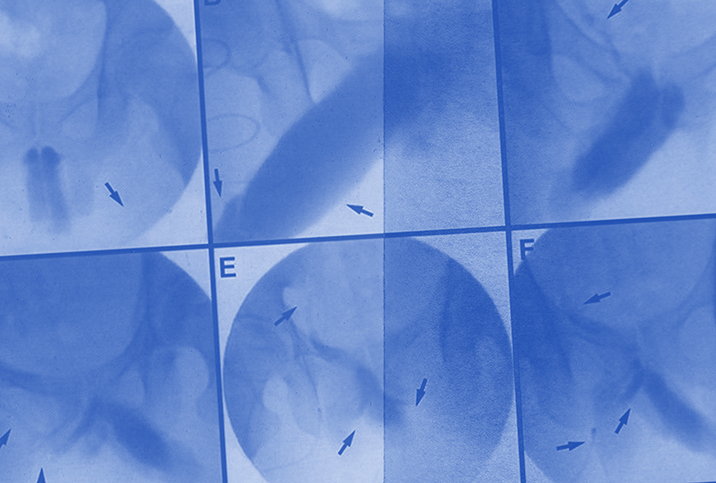A Venous Leak Could Be the Reason for Erectile Dysfunction

An erection's mechanics seem pretty simple, especially for guys in their teens and 20s. A visual or tactile stimulus is presented and a boner ensues. You should know, however, it's more involved than that—even when it seems easy.
For an erection to occur, blood travels to the penis through the arteries and then stays there to maintain the rigidity needed for penetrative sex. If the veins—the blood vessels that return deoxygenated blood to the heart—are not constricting to trap the blood inside, the blood "leaks" back into the body, and the erection softens. This counterproductive action is known as veno-occlusive dysfunction or venous leak, and it's one of the causes of erectile dysfunction (ED).
"A typical story of what a venous leak might sound like is, 'I can get an erection just fine but when I start having sex, I can't maintain it,'" said T. Mike Hsieh, M.D., a professor of urology and the director of the Men's Health Center at University of California San Diego Health.
Another telltale sign of a venous leak is when the man has a much more rigid erection while standing than while lying flat on their back, said Helen Bernie, D.O., a urologist and the director of sexual and reproductive medicine at Indiana University Health in Indianapolis.
Bernie said that although a venous leak cannot be cured, it can be managed with "erectogenic" therapies, meaning drugs and devices that cause an erection.
"Most men, based on a multitude of factors, will pick which option is best for them," she said.
Causes of venous leak
Venous leak can be caused by a variety of medical conditions and lifestyle choices, including vascular disease, poorly controlled diabetes, high blood pressure, high cholesterol, tobacco use, low testosterone and pelvic surgeries. It's also linked to Peyronie's disease, obesity, anxiety, stress and nerve conditions.
Some men have a congenital venous leak problem, meaning they're born with it, Hsieh said, adding that patients with diabetes, high blood pressure, heart disease, and other cardiovascular issues typically have an arterial, rather than a venous, problem.
If a patient has a severe arterial problem, they may not be able to get an erection at all because blood is not traveling to the penis properly. With a venous leak, they're typically able to get an erection, but aren't able to keep it.
Diagnosing venous leak
A commonly used diagnostic tool for a venous leak is the penile duplex Doppler ultrasound (PDDU), which measures blood flow in the penis in centimeters per second. For peak systolic velocity (PSV), 30 centimeters per second or greater of arterial blood flow is considered normal. The end-diastolic velocity (EDV), which measures blood flow leaving the penis through the veins, should be less than 3 centimeters per second.
Hsieh performs the PDDU in two phases, once when the patient has a flaccid penis and again when they have an erection.
"If I see abnormal blood flow in the arteries or the veins with an erection when compared to the flaccid state, that's how we make these diagnoses," he said.
For example, if a patient has a normal PSV reading but an elevated EDV of, let's say 6, that would be considered venous leak, said Seth Cohen, M.D., an assistant professor of urology and director of sexual medicine at NYU Langone Health. The arteries are delivering plenty of blood flow to the penis, but the blood is just leaking right back out.
With a venous leak, [patients are] typically able to get an erection, but aren't able to keep it.
Cohen provided some examples of scenarios he sees in patients.
"Typically, your average diabetic may have arterial problems like cholesterol problems, depositing plaque within the arteries," Cohen said. "They're going to have slightly lower peak systolic velocities. Their EDV should be normal."
On the other hand, a patient who fractured their penis in a serious car accident may have normal PSV but considerably elevated EDV.
"Their veins have been traumatized or damaged, so they can't trap the blood in the penis," he said.
Treating ED caused by venous leak
ED caused by a venous leak can be treated with phosphodiesterase type 5 (PDE5) inhibitors—these are ED drugs such as sildenafil (Viagra), tadalafil (Cialis) and vardenafil (Levitra)—penile constriction bands, vacuum erection devices and intracavernosal injection therapy. If none of these methods can overcome the venous leak, penile implant surgery may be recommended.
"A lot of men come in with erectile dysfunction and the pills aren't satisfactory to them or they have bad side effects," Bernie said. "They may choose that they don't want to do a vacuum erection device or they don't want to stick a needle in their penis for intracavernosal injection therapy. As a result, they want to go directly to a penile implant."
With a penile implant, hydraulic water balloons replace a man's natural mechanism for erection, Hsieh explained. The man inflates the balloons manually to create an erection and deflates them when he doesn't need an erection.
"Many men would prefer to have a natural erection as opposed to getting a penile implant," Bernie noted.
Pills and injections can only help with mild cases of venous leak.
"If you have severe venous leak problems, any of those medications that help with the arterial side of things will not help," Hsieh said, adding that pills and injections can only help with mild cases of venous leak.
A constriction device may help a man with venous leak maintain an erection. It's essentially a rubber band at the base of the penis that pinches the veins with blood leaking out, Hsieh explained.
Historically, surgery was performed on the veins to treat venous leak. Surgeons tied off the veins in the hopes of keeping the blood in the penis, but this action didn't always work, Bernie noted.
"We've actually found out that they can end up causing more harm than good," she said. "We would try to treat something and we would end up creating more erectile dysfunction."
ED is more often an arterial problem
Hsieh said most of the ED cases he sees—at least 80 percent—are not due to venous leak but rather arterial problems, because ED is often related to cardiovascular conditions.
The rest of the cases are either a mix of both arterial and venous issues or isolated venous leak. In isolated venous leak cases, patients have typically had surgery or cancer treatment that disrupted the normal anatomy or physiology, he said.
Venous leak may sound like an obscure condition, but it can cause serious problems for your sexual function. Fortunately, you have many different options for treating venous leak, so talk to your doctor about this possible cause if you're having trouble maintaining an erection.


















